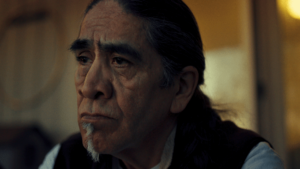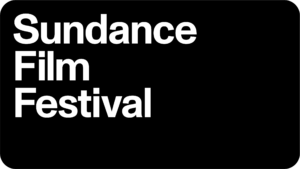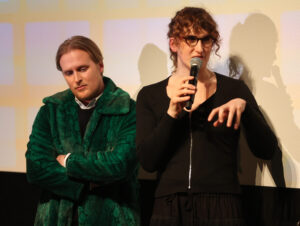Melanie Lynsky and Christopher Abbott in ‘Hello I Must Be Going’
Sundance Institute
If cultural historians were to happen upon a time capsule containing the 2012 Sundance Film Festival’s Day One lineup of films, they’d have a comprehensive overview of the breadth and depth of high quality independent filmmaking programmed into this year’s Festival. What’s more, this diverse array of works by established and up-and-coming talents would offer a microcosmic snapshot of the state of our society at large – its passions and preoccupations as well as cultural and creative sensibilities.
Because we don’t yet live in a space-age world where it’s possible for one human to see two movies at the same time—hey, few could have ever predicted we’d have talking maps or the toothpaste pump, so don’t rule it out—we dispatched our crack team of writers to attend each Day One screening. The following mosaic of ideas and impressions exchanged at each of the five events provides a tantalizing taste of what promises to be a Festival as entertaining as it is enlightening.
The Queen of Versailles
By Bridgette Bates
 Jackie Siegel (middle) at the premiere of Lauren Greenfield’s Queen of Versailles. Photo by Calvin Knight.
Jackie Siegel (middle) at the premiere of Lauren Greenfield’s Queen of Versailles. Photo by Calvin Knight.“We’re in a period of immense change,” remarked Robert Redford at the world premiere of Lauren Greenfield’s The Queen of Versailles, which opened the U.S. Documentary Competition last night. During the three years that Greenfield worked on The Queen of Versailles, the film and its subject changed immensely.
The film follows the obscenely rich Siegel family—David, a Florida time-share mogul, and his wife Jackie, a former Mrs. Florida, and their herd of children and pets—and their in vain attempts to build America’s largest house modeled after Louis XIV’s palace—or, more accurately, a Las Vegas imitation of monarchic French architecture. Early scenes of this doc unfold as an artfully crafted episode of Real Housewives. But the autumn 2008 comes around, and the Wall Street crash and real estate bubble bust and quickly turns the story on its crowned head.
At the film’s Q&A, Greenfield responded to questions about the story’s tonal shift. “It becomes more of a tragedy or human drama as the family deals with this crisis,” she said, adding that the film transforms into “an everyman story.” Even as we begin to feel some (albeit mixed) sympathy for the Siegel’s downfall amid all its conspicuous consumption and disconnection from reality, a profoundly melancholic sense of a sliding scale of dreams gradually emerges, creating the film’s most compellingly universal subtext. From moments with the Siegels’ immigrant staff, who share the hardships of living away from their real homes in the hopes of providing for their families, to scenes of empty office spaces signifying the thousands of layoffs in David’s once thriving business, we are tenderly reminded how dreams, big or small, are relative to the individual and yet vital to all.
Jackie, in all her beauty queen glory, attended last night’s premiere to watch her dreams deferred on screen for the first time. Standing in solidarity, a friend of Jackie’s asked the director if the film could be re-edited to reflect the Siegel’s financial recovery. Despite the presumptuousness of the ask—or the fact that it missed the point of the film—it was oddly heart-warming to know there was still a dreamer in the house.
Searching for Sugar Man
By Claiborne Smith
 Director Malik Bendjelloul with the subject of Searching For Sugar Man. Photo by Jonathan Hickerson.
Director Malik Bendjelloul with the subject of Searching For Sugar Man. Photo by Jonathan Hickerson.At the world premiere of Searching for Sugar Man at the Library Theatre, Swedish director Malik Bendjelloul seemed a little overwhelmed. He first found out six years ago about the mysterious story of Rodriguez, a supremely talented musician who recorded two albums in the early 70s that were promptly ignored by all of America.
In this country, as he was rumored to be dead after setting himself on fire at a concert, Rodriguez’s anti-establishment songs and indelible, authentic lyrics made him one of South Africa’s most popular musicians. His albums were passed around among friends during the apartheid era, if they weren’t first confiscated by government censors. Bendjelloul has been working on the film for four years and sitting at an editing bay for the last two. So to have his film out in the world for the first time and screening for a packed audience was, as he said at the premiere, “very emotional.”
It’s impossible to report the news from last night’s screening without revealing one of the mysteries solved in Searching for Sugar Man: Rodriguez appeared at the Q&A after the screening (to a standing ovation), which means that Rodriguez did not, in fact, light himself on fire at a concert. He’s been living a quiet life as a construction worker in Detroit. But anyone upset by having the beans spilled here should take heart in the fact that there’s a deeper mystery in Searching for Sugar Man.
It’s an enigma Bendjelloul explores, but one that would be near impossible for any director to entirely solve: how Rodriguez, ignored in his homeland, could so stoically endure that abandonment while not knowing—or receiving profit from—the fact that he is a national hero in South Africa. Elliptical, reserved, bemused, and shrouding himself in mystery, Rodriguez didn’t finish all of his sentences at the Q&A last night. You got the sense that he wasn’t being cryptic because he was nervous or had stage fright; but rather because he’s an artist whose experience has taught him to ruefully understand the value of keeping it close to the chest.
Wish You Were Here
By Eric Hynes
 Director Kieran Darcy-Smith at the premiere of Wish You Were Here. Photo by Steven Speckman.
Director Kieran Darcy-Smith at the premiere of Wish You Were Here. Photo by Steven Speckman.The Aussie invasion continues unabated—or even invited, for that matter. At the Library Theatre on Thursday night, the Festival launched this year’s World Dramatic Competition with an opening night world premiere of Wish You Were Here, the latest film from a gathering wave of accomplished Australian indies.
Kieran Darcy-Smith’s debut feature comes to the Festival just two years after David Michod’s Animal Kingdom took home the World Dramatic Competition Jury Prize. Both films star the ruggedly alluring Joel Edgerton, who was on hand to present the film with a dapper but nervous Darcy-Smith (“I’m having kittens here,” he said before the film, “It’s hard to speak”) along with the principal cast and crew.
The story of a family man whose world starts crumbling around him after a double-date getaway to Cambodia ends with his companion’s mysterious disappearance, Wish You Were Here was the product of several layers of close collaboration. Darcy-Smith co-wrote the script with his wife and lead actress, Felicity Price, and developed the story and film in participation with the other members of Blue-Tongue Films: Edgerton and brother Nash’s rough and tumble collective, which produced two previous Festival shorts, Spider and I Love Sarah Jane as well as Bear screening in this year’s Festival.
“We’ve always read each other’s work,” Price said, “and Joel and Nash have always read Kieran’s work. So when we started writing the project together, it wasn’t a complete unknown. We knew how we could help each other, what each other’s strengths were, and could build a writing team. It’s a great process because you’re living and breathing the film the whole time. You’re changing nappies, going for walks, driving the car—and you’re talking about it the whole time.” Darcy-Smith concurred. “I’d jump into bed with her again in a heartbeat,” he said, drawing laughs.
Producer Angie Fielder said that the Aussie invasion is for real. “The industry is definitely on the up and up. There’s a really great new generation of filmmakers coming through, including the Blue-Tongue guys,” as well as more mainstream fare. “There’s a great mix of commercial work and arthouse work, and that makes for a really healthy industry. It’s an exciting time to make films in Australia.” With this latest film screening all week, it’s a great time to wish you were here at Sundance.
Hello I Must Be Going
By Jeff Hanson
 Actress Melanie Lynskey and director Todd Louiso at the premiere of Hello I Must Be Going. Photo by Steven Speckman.
Actress Melanie Lynskey and director Todd Louiso at the premiere of Hello I Must Be Going. Photo by Steven Speckman.A movie about a hopeless, listless divorcee re-discovering her groove in the arms of a steel-eyed teenage hunk often treads precariously on the precipice of cliché and camp. Yet when the story is thoughtfully crafted by Sarah Koskoff and expertly framed by Sundance veteran Todd Louiso (Love Liza), it quickly sheds itself of any risk of eye-rolling ridicule and instantly becomes an engagingly accessible portrait of real life.
Yes, Hello I Must Be Going is a love story in the classically non-classic sense. Yet its reach extends well past the obvious tale of verboten desire; and moves seamlessly through a story of self-realization and courage. Actor Melanie Lynskey couples her formidable talent with an honest vulnerability as Amy Minsky, who is drowning in a sea of pathos brought about by her recent divorce and the incessant criticism of an equally miserable mother, played acerbically by Blythe Danner. Christopher Abbott, a bright newcomer with oodles of appeal, brings surprising wisdom and warmth to his role as the young man who rocks Amy’s world, and subsequently his own.
The film premiered to an enthusiastic opening night audience at the Sundance Film Festival Thursday evening. During the post-screening Q&A, Koskoff reacted warmly to the suggestion that her script was a modern day “coming-of-age story for an adult.” She shyly admitted that the genesis to her screenplay and its main character was born out of her own moments of depression and a realization that her life wasn’t panning out in a way that she, and everyone else, had expected. It just goes to show that the journey to personal reclamation can be a tricky yet rewarding ride, both on screen and off.
Shorts Program I
By Nate von Zumwalt
 Directors fielding questions after the premiere of Shorts Program I. Photo by Jonathan Hickerson.
Directors fielding questions after the premiere of Shorts Program I. Photo by Jonathan Hickerson.Shorts Program I premiered last night at the Egyptian to an exuberant audience and an atmosphere more indicative of a party than a film premiere. The six-film program featured an impressive display of both content and craft, leading with the hilarious “anti-wedding” film Tooty’s Wedding and transitioning into a haunting depiction of Somali pirate life in Fishing Without Nets, a story director Cutter Hodierne felt compelled to tell “because it is the only story you cannot tell.” Next up was Grant Orchard’s cleverly animated A Morning Stroll, a thoughtful and amusing tale portraying a New Yorker’s morning walk in three different eras, and a loss of human values over that time.
In a lineup of such competitive and contrasting artistry, a true “headliner” was noticeably absent. Nevertheless, Johannes Nyholm’s Las Palmas emerged as a crowd favorite, featuring a miniature set that merged claymation, puppetry, and a real life baby (the director’s daughter) with the sartorial taste of a 60-year-old woman—fanny pack and all. Nyholm’s bashful disposition during the Q&A session only further endeared him to the audience as he explained that the film began as a “day in the life documentary” starring his daughter. “It’s still a documentary in a way,” he quips. “She sits around and eats and drinks like she normally does.”
Jill Soloway’s Una Hora Por Favora and Alexis Dos Santos’s Random Strangers rounded out the slate of shorts with two original love stories that creatively capture the times we live in. Soloway’s film stars Michaela Watkins as a single woman who hires a day laborer (Wilmer Valderrama), whom she ends up courting, and Dos Santos’ short chronicles an online relationship in a touching postmodern fashion. The lineup was artfully designed to follow an overarching narrative, deftly shifting between styles and genres, and providing enough laughs to last the rest of the Festival—not a bad way to ring in the 2012 festivities.




